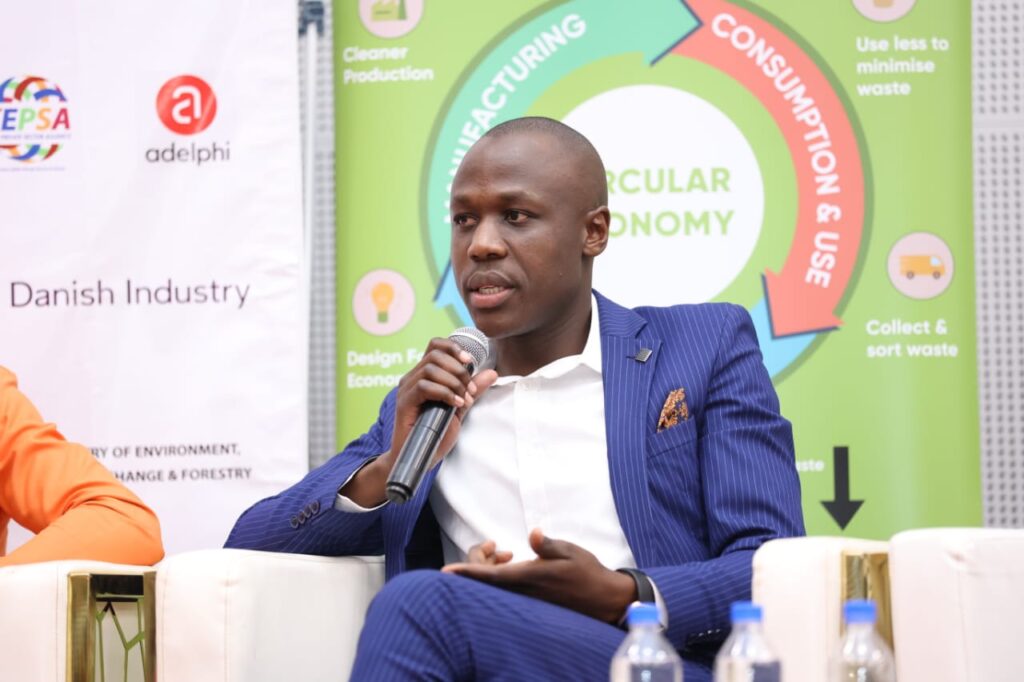One On One With James Odongo

Tell us a bit about yourself:
My name is James Odongo. I’m the Chief Executive Officer of KEPRO.KEPRO is essentially an organization that is keen on implementing extended producer responsibility. This is a provision that was enacted by the Waste Management Act of 2022, mandating that all producers must comply or institute EPR schemes based on the products they’re introducing to the Kenyan market. So far, we have around 700 members who provide regulatory compliance for as far as the issues on the EPR regulatory requirements are concerned.
How long have you been CEO?
This is my second year. I joined KEPRO in 2023, January. So I’m starting my second year officially. I’m in my first month of the second year.
How has the experience been so far?
It’s been a roller coaster. I think running an organization and recognizing that we still don’t have all the regulations gazetted means that every day is a new challenge. So first, given that the PRO is still a new concept in Kenya, everyone is looking at you to try and provide solutions. And so sometimes we have good days and sometimes we have tough days. But I think we can say we’ve made good progress. I think as a PRO, we’ve been first in quite a number of initiatives, developing the first waste collector’s toolkit. I’d summarize it as it’s been a roller coaster.
What are some of the challenges you face as CEO?
One of the biggest challenge is Kenya requires a formalized waste ecosystem currently it is largely informal. So that has meant that placing in place strategies is quite active. And the situation is further compounded by the lack of adequate data. So adequate data in terms of the different waste management actors, the different material fractions as far as waste is concerned, the location of the said waste, and of course, the aspect of the capacities of our recyclers in the country.So you’d realize that our recyclers are focused on what were traditionally material fractions that were profitable and leaving other fractions that are still either and recyclable and the like. So also trying to put up or appreciate that the infrastructure is still developing has also been one critical challenge. And the other one I’d already mentioned is that we have the Sustainable Waste Management Act providing for EPR as a mandatory requirement, but the regulations to operationalize the act are tired to be gazeted. So that means the interpretation of the law is at everyone’s whims, and that means sometimes you have to do guesswork to fit into the interpretation of the individual entities that are interpreting the law.
Where do you see yourself in the next 10 years?
I’m looking at potentially being a thought leader in the circular economy space.There needs to be more mitigative and adaptive approaches in solving the issues around climate change. So increasingly, you’ll see a lot of opportunities coming into that space. Being among the first front runners in terms of the implementation process, I think being within that space as a thought leader would also be quite self-fulfilling for myself And of course, for KEPRO.
Many people consider you accomplished.What can you say is the secret to your success?
That’s quite flattering. And you might be surprised. I’m not as young as I might look. Looks might be deceiving.But I think, and I’ve always ordered it to a few of my mentors, one who’s really played a critical role My role in where I am was a mugure. She’s an architect, she’s called Mugure Njendo. By then, she was the President of the Architecture Association of Kenya,where I started my career. She nurtured and gave me some discipline that has always been a key ingredient in terms of my output as far as the different organizations I’ve worked with are concerned. The other bit is, breaking the glass ceiling has always been my motivation. So being better every day inspires me to do better. So just continuously improving on yourself, leveraging on the opportunities that are there, is what I would say is also one of the secrets of success that I would like to mention.
What would you like your legacy to be?
I’m still too young to imagine I’d have a legacy, but I think I’d want history to judge me right, that I contributed to a narrative that not only contributed to realization of a clean and healthy environment in Kenya, but also protecting and ensuring that we have a sustainable world for the future generations. That is what I feel my legacy should be all about.
Tell us a bit about your academic background:
My academic background is in urban and regional planning. I’m an urban planner. To be honest, I’ve never sat down to do any drawings or whatever from a technical point of view. I steered towards advocacy and policy approach. My main focus has always been policy, research, and advocacy. Then I’m also doing my Master’s in Urban Management. I also have a 360 understanding of the urban issues just beyond the issue of solid waste. Those are my two specialities from an academic and professional standpoint.
What about family background?
My dad has for the longest time has been an entrepreneur. He started out as a civil and building contractor, then slowly he got into farming.
What about your mom?
My mom was a business person, initially running a salon and beauty shop. she’s now retired.I was born and raised in Nakuru then came to Nairobi for school and work.
Are you the only CEO in your family?
Yes, I think I’m the first CEO in my family. I’m proud to say that. My sister is a lawyer, although she’s currently based in the US. My other brothers, one is working at a courier delivery company, one of the largest in the country as a fleet supervisor. The other one is also working as a fleet supervisor in a small farm in Nairobi. Then I have a last born, recently finished high school, wants to do engineering.
What is your message to Kenyans?
From a waste management point of view, we are getting to the point where everyone has an individual responsibility. We must recognize that even despite the fact that companies have a responsibility, as an individual at your household level, you also have a responsibility to ensure that you’re properly disposing off your waste. So when you properly dispose off your waste, you’re not only contributing to individual livelihoods for those that are in the waste collection and recycling businesses, but you’re also speaking to the reality of a need for a clean and healthy environment. So you’re also playing your part as a citizen of Kenya for the fulfillment of that goal.




